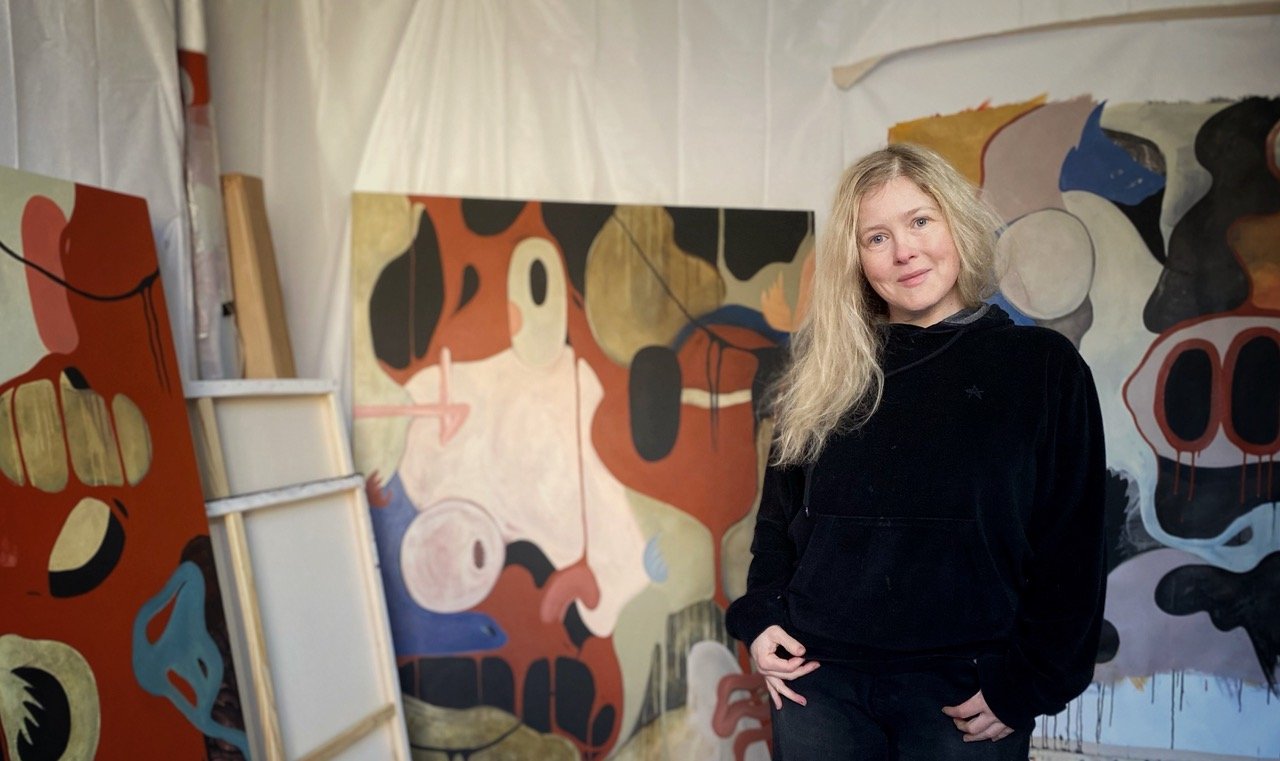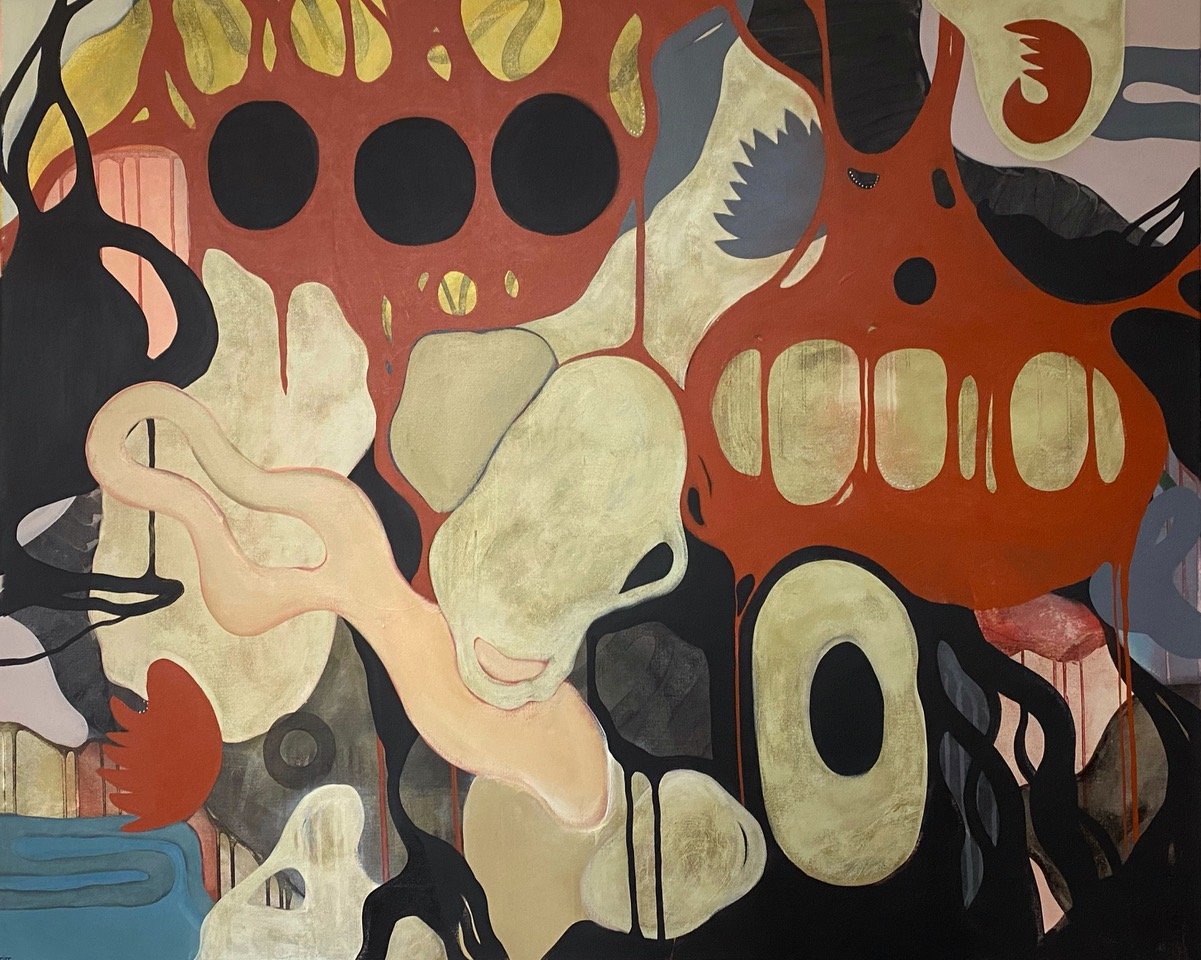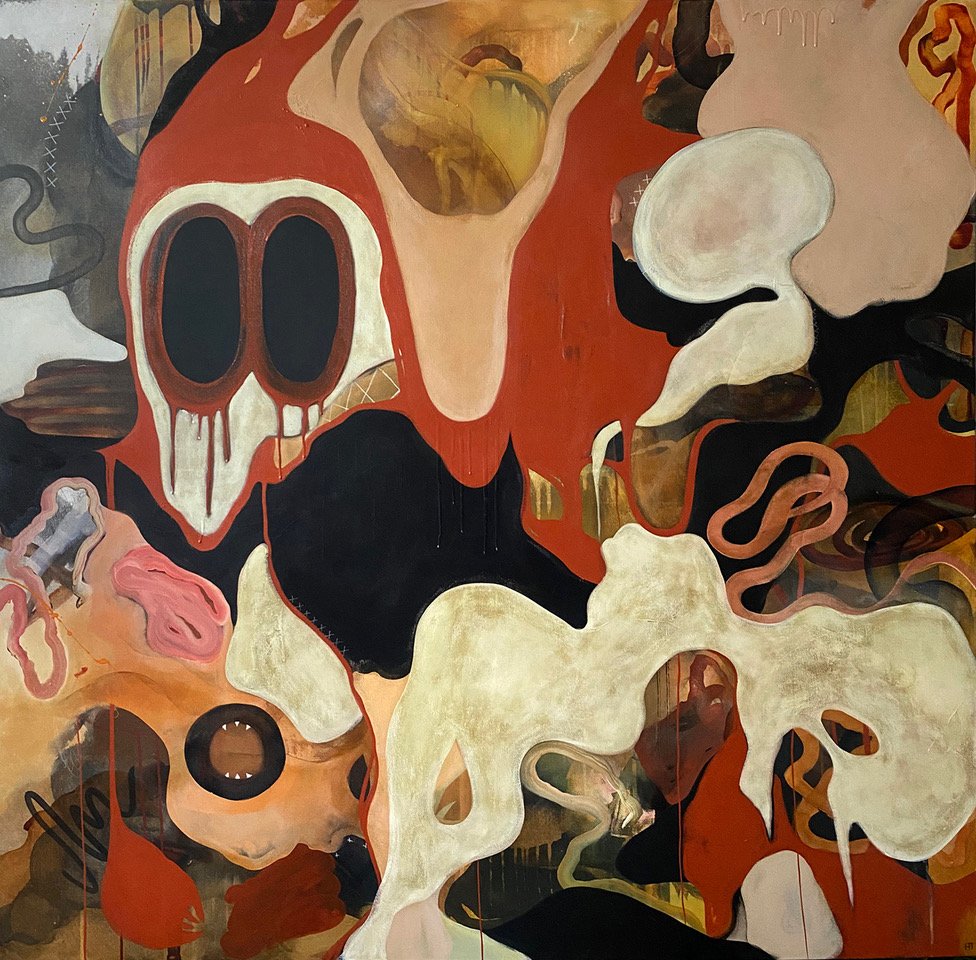Interview with Hannah Thomas

Hannah,
You talk about turning to painting after becoming disillusioned with commercial photography. Tell us how your prior experience helped shape you, motivate you and prepare you to become an artist.
Well, fundamentally I considered myself an artist when I was photographing, but somehow calling myself a ‘photographer’ seemed less pretentious.
I was never really a commercial photographer as such, my music imagery was not like what was being published and my ideas of beautiful images didn’t really have an audience in the heavy rock/metal world! However, I did manage to garner an archive of great shots and some amazing experiences over the ten years I was living in East London, all my tenacity and learning how to turn my nerves into energy was learnt in the photo pit at gigs. That has served me very well in the early years of my painting practice. I am always powered by a relentless impatience and sense of urgency which can be quite useful.
Also, it meant I entered into my painting practice with a very clear idea of what I wanted to achieve, how I wanted to work and more importantly, what I definitely didn’t want. Painting to me had always seemed an area where artists could be really free and unconstrained, and more importantly having worked collaboratively for so long as a photographer, a practice where you could work entirely independently, in the studio at least, and without artistic interference. I approached it with that attitude, it was the driving force for me. Hence my painting output is pretty uncommercial too, I made a deal with myself to not censor or water down my work to make it more accessible.
What influences you the most when you are in the process of creating a new artwork?
If it’s part of a series, previous pieces in that series and the themes which are running through it. On a more sensory level, music is very important, I always paint to a soundtrack. Having a vague idea of what the title of the work is can be helpful. One of my recent pieces, Mental Freeze, I painted that knowing it would be called that after playing the Breeders album ‘Last Splash’. There is a line that goes ‘motherhood means mental freeze’. Knowing that would bring distracting controversy I just kept the last bit! Although I personally love that line and could go into quite a dialogue about it.
Also, literature; I was a complete bookworm when I was a teenager, I read and read. Those books woke me up – although they are probably also responsible for my sometimes unhelpful natural romanticism – and I often have a few particular lines in my mind when I start a painting. Membrane, for instance, which was in the Emerge exhibition, was named after a line that went ‘culture itself a fragile membrane stretched over darkness’ (Literature of Guilt by Patrick Reilly). But those books are all still with me, full of pencil marks and highlighter pen and are a constant well of ideas, especially for painting titles.
Wonderland, Hannah Thomas
You reference the concept of “flow” in your work. It really comes through to the viewer (at least this one!). Can you elaborate on this and tell us if you prepare for each work session in any specific way?
I think ‘flow’ applies mostly to my process, in that I rarely plan ahead and the colors and marks I make are largely decided in an instinctive way as I go. I usually don’t know exactly what I’m going to paint when the brush is put to canvas. The latest works do have a sense of flow, although I am quite conscious of keeping them a little off balance as well, compositionally or with the color choices. Certainly the use of red oxide in the Borderlands series helps the paintings to flow and hang together, it’s a unifying element and very important.
I do almost no prep for a session in the studio beyond sticking the music on and seeing where it goes. Possibly because in the main I’ve always had home studio spaces, through necessity rather than choice, and consequently one moves in and out of the workspace throughout the day. I did briefly have a designated studio space away from home and I did find that I arrived with more of an agenda for the day. But, actually, I found it less productive in some ways, it felt less organic and more formal. I’ve never responded well to formality.
I don’t have a mental state I need to be in to paint although I am often shocked at how many artists say they need to be feeling ‘happy’ or in a calm mental state to work. I have to say that I thrive on a certain amount of agitation or adrenalin and my paintings benefit, they come faster and with more visceral results and I don’t get a chance to overthink them. Plus the obvious art as catharsis element.
Which artists are you most inspired and influenced by and why? Is there anything about their life stories that resonates for you or just the work?
I was not trained in painting, and when I was in art college doing photography based art works, painting was the least interesting to me of the disciplines. Which is possibly why Francis Bacon was so revelatory to me, he made paint so powerful and violent and fascinating. I loved his works and found him incredibly erudite and self-aware in interviews, so intelligent and at the same time a really interesting and difficult personality, just what a great artist should be
I love the work of photographers Sally Mann and Robert Frank. Cinema is very important, David Lynch in particular. There is a painter that I have recently on Instagram called Johan Van Mullem whose work is pretty riveting. But artists who live viscerally and without apology and whose work exists apart from whatever the current trends or politics are, they are the individuals I admire.
Amnesiac, Hannah Thomas
How does your art create meaning or deliver your message?
Well, my work is heavily imbued with ideas of Absurdism, which is based on the theory that humanity always seeks to find meaning and significance in an existence and universe that doesn’t inherently have any, which is the cause of a lot of their unhappiness and frustration. I hope my art conveys a sense of flux and chaos, dark and light, and a healthy dose of the absurd because I think it’s by far the most liberating philosophy I’ve yet come across. Each individual must simply find
their own meaningful pursuits and stop proselytizing to everyone else about what they consider to be important, because, ultimately, none of it’s that important. Personally, I find that liberating, but I know many wouldn’t.
What is your feeling about art and artists related to social change and amplification?
I had better keep my answer brief on this as otherwise I’ll rant on for ages. I am not personally moved by art that is mired in social or political rhetoric or uses it to gain exposure. Art can most certainly be powerful and cathartic, but I think it loses something when it roots itself so specifically in a moment in time or a particular cultural zeitgeist. It’s also partly because I don’t like feeling shouted at by a piece of art, like the artist is on a soapbox telling me what to think and exactly what it’s about. Art is most powerful when it remains mysterious and allows for subjective interpretations from the viewer, I think. Interestingly, I think that photography is a much better medium for this sort of social and cultural documentation and is more powerful.
Obviously, there is also the issue of quality which can fall by the wayside somewhat, due in part to social media and hashtags. People are so keen to be identified with a certain political movement, and obviously I am not questioning their genuine support for that, but there is an element of scoring morality points by being seen to support things and I think the actual work can often get away with being pretty mediocre. (below: Membrane, Eruption, and Mental Freeze)
What are your career goals or things you hope to achieve as an artist?
As an entirely self-taught artist, I would really like to be represented by a good quality gallery. I like the idea of having that rudder and guidance, so much of what I’ve achieved so far has been done groping blindly in the dark, solo, without any real feedback or assistance and I would really value industry support for my practice and the chance to have that potentially collaborative relationship with someone invested in your work and keen to see you succeed.
I am really looking forward to participating in physical exhibitions too, something that due to lockdown and financial limitations I have yet to really experience.
How do you think about cultivating relationships with collectors? Is there any advice you would offer to other artists?
As of yet, I know very little about this. My sales so far have largely been online and through various platforms, so I’ve not really had much contact with the actual buyers. I think it’s a nice idea that collectors want to get to know about the artist making the work and then choose to support them in a way that’s lasting.
Do you have a dream project? What might that be?
A solo show in London – I know that probably sounds a bit predictable but to have the opportunity to be hands on helping with the whole process would be so exciting, the hang, curation, private view, promotion etc. London is important to me, I lived in East London for ten years and they were hugely formative years during which I fell totally in love with the city. Despite moving away, unwillingly, I still consider it my spiritual home. It would mean a huge amount to have my work hanging in a good space in that city.







